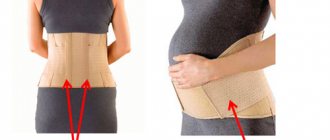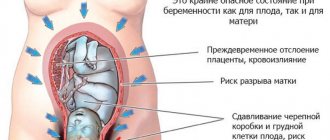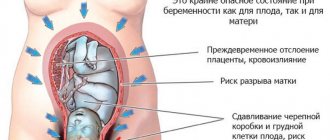Hard belly at 38 weeks pregnant
At the thirty-eighth week of pregnancy, various precursors of labor appear, which indicate that the pregnancy will soon be resolved by the birth of a child.
However, before the onset of labor, various phenomena are possible that may alert the expectant mother. Most often, these phenomena are associated with changes in sensations in the abdominal area.
Uterine tone
Throughout the entire period of pregnancy, the tone of the uterus was considered a dangerous phenomenon, but when the 38th week of pregnancy, the stomach will be in good shape in any case, since we are talking about the approaching labor.
In appearance, the tone of the uterus can hardly be confused with some other phenomenon; its characteristic signs are such that the abdomen seems to become stone and harden.
If at 38 weeks of pregnancy your stomach becomes hard, then it makes sense to say that you will have to go to the maternity hospital in the near future. It is advisable at this time, if possible, to go to the maternity ward in advance if we are talking about childbirth paid for under a contract. Otherwise, you should pack your bag for the maternity hospital so that you are always ready.
What does petrification of the abdomen mean?
In fact, despite the fact that the belly of stone is generally considered to be training contractions, one should not underestimate their effects, since the belly of stone in this case indicates that with each such phenomenon, a softening of the cervix occurs.
Of course, it is too early to talk about the opening, which usually occurs during labor itself, but at 38 weeks of pregnancy, a hard belly indicates that the cervix is preparing for childbirth in this way.
If the expectant mother experiences too much discomfort due to this phenomenon, then it would be advisable to consult a doctor, since this phenomenon can be dangerous for both the expectant mother and the child.
www.webkarapuz.ru
Stomach rises at 38 weeks of pregnancy
Category: Pregnancy by week | August 6, 2020 | no comments yet
At 38 weeks of pregnancy, labor can begin on any day, or about a month will pass before such a joyful and exciting event.
All this falls within the normal range; girls are especially in a hurry to be born. And if you are expecting a beautiful daughter, listen to your feelings. If you are alone for a long time, keep your phone handy.
Delivery at the 38th week of pregnancy is full-term and timely.
38 weeks of pregnancy - what happens, fetal development, photo
- The stomach has risen 16-18 cm from the navel.
- Discomfort – sleep disturbance, false contractions and swelling.
- My chest became heavy.
- The hormonal background is changing.
- The pelvic bones move apart.
- Ligaments and cartilage soften.
- The skin on the abdomen is stretched and itchy.
- An imminent birth is foreshadowed by pain in the lower abdomen, stiffness of the abdomen, back pain, and discharge.
At the 38th week of pregnancy, the precursors of labor for primiparous and multiparous women are similar:
-stomach drops
- there is a feeling of tightness,
- the stomach turns to stone,
-discharge appears
- weight loss slightly.
If you are 38 weeks pregnant and this is your second birth, all the warning signs can be rapid, and within a short time after their appearance you will already be lying on the delivery table surrounded by doctors.
Many mothers are concerned about the question: “How to induce labor at 38 weeks of pregnancy?” The desire to give birth faster is quite understandable, but there is no need to rush things, the baby himself knows when to be born. Moreover, you need to know for sure whether the child is in the correct position and whether his organs are formed. The safest ways to speed up the process are walking and sex.
The baby's height is about 50 cm and weight is 3 kg. In boys, the testicles descend into the scrotum, but in general the baby is fully formed and ready for birth. He is cramped in the uterus, his movements are constrained, but coordinated. The heart beats 120-160 beats per minute.
The baby's head is pressed tightly against the cervix.
If at 38 weeks of pregnancy the baby is actively moving, most likely this is a sign of hypoxia, but until there has been an examination, do not panic, perhaps it’s all about the characteristics of your body and the development of the fetus.
38 weeks of pregnancy - ultrasound photo
38 weeks pregnant - how to behave
- If you have insomnia, drink a glass of warm milk before bed.
- Sleep on your left side.
- Don't sit or stand for too long to prevent your legs from swelling.
- Walk around the room during contractions. If the contractions are false, they will stop while walking.
- Choose the right bra made from thick cotton fabric.
- Apply almond oil or stretch mark cream to your stomach every day.
- If you still haven't figured out what you need to take with you to the hospital, it's time to do it now.
Hypertonicity during different periods of pregnancy
The belly can become hard at any stage of pregnancy.
In the early stages, this occurs due to global changes in the body. Nausea and nervousness appear. These factors lead to uterine hypertonicity. Additionally, it is accompanied by the appearance of pain in the right side. In the second trimester, hypertonicity occurs less frequently. This indicates pathology rather than normality. Such signs indicate a threat of termination of pregnancy if, in addition, there is discharge with blood. Discharge from the genital tract is not normal. Therefore, at the slightest feeling of hardness, go to your family doctor.
Under mother's protection
In the last trimester, the belly becomes large as the fetus begins to rapidly gain weight. The baby doesn't have enough space and gets this feeling. When your belly becomes hard at 37 weeks, know that this is normal. No need to worry. At the same time, pregnant women feel the “rhythmic” movements of the baby.
At week 38, this sign indicates that premature labor may begin. If the stomach, for unknown reasons, becomes stone in the 3rd trimester, at 39 and 40 weeks of pregnancy this is a natural phenomenon. A woman’s body reports its readiness for childbirth.
The condition is dangerous in the 2nd trimester, since uterine hypertonicity can lead to irreparable consequences.
When does the belly drop during pregnancy?
December 12, 2014 | views: 2,611
Pregnancy is always mysterious for others and the woman herself. No wonder. After all, a new person emerges from a small cell, which changes, grows and develops every day. The fruit, which is only 4 cm long, already has tiny nails! Every moment is unique: the first movements, tremors, changes in appearance, even the day when the belly drops during pregnancy. Many people are interested in the question of when this happens. For most women, the belly drops after the 35th week, when the pregnancy comes to an end. But this is all ahead, because many more amazing events will happen in the future.
Until a certain moment, a woman does not feel the child inside herself. Unless toxicosis and malaise make themselves felt. The first movements will appear no earlier than the 17th week. and usually even a little later. Most expectant mothers feel the first tremors around the 20th week.
Changes in the figure begin gradually. This nuance depends on the place of attachment of the future fetus to the placenta. It can be on the back or front wall. Most often, a slight rounding of the abdomen is noticeable to a woman around the 12th week. In thin girls, the belly is more noticeable, in plump girls it may not be noticeable even until the 7th month.
Belly shape
The size of the abdomen determines the fundus of the uterus. The course of pregnancy depends on this indicator. Any doctor can check the relationship between fetal size and term just using a measuring tape.
Many women are interested in what determines the shape of the abdomen and when the belly drops during pregnancy. In the absence of pathology, the form is usually ovoid. It depends on the number of fruits and their position, as well as various factors. For example, with polyhydramnios, the stomach takes the shape of a ball; if the child is in an incorrect position, it takes the shape of a transverse oval. During the first pregnancy, the stomach is slightly pointed, and during subsequent pregnancies it is drooping. The longer the period, the more visible the changes in the female body are.
When the stomach drops depending on the period:
- The belly will begin to droop shortly before childbirth, usually no earlier than the 35th week of pregnancy.
- If the stomach has dropped much earlier than expected, for example, 10 or more weeks, you should consult a doctor.
- At 36 weeks, when the belly drops, it only means that the baby is already quite strong and ready to be born.
- If at 37 weeks of pregnancy the belly drops, then this is not a problem, since at this time the baby is already considered full-term.
Measuring the uterine fundus
People talk about the upcoming birth during pregnancy when the stomach drops a few weeks before the upcoming date. If the pregnancy proceeds without pathologies, then usually the stomach can drop, starting from the 36th week of pregnancy. Until this point, the height of the uterine fundus is checked every week during examination. Therefore, it will not be difficult for an experienced doctor to notice a belly that has sagged or changed shape in the last weeks of pregnancy. It is believed that the fundus of the uterus rises one centimeter per week. That is, the indicator must be equal to the term. More often than not, this is what happens. Discrepancies occur depending on individual characteristics, depending on the gained and initial weight, and, of course, with developmental delays.
Last weeks before giving birth
The closer to the due date, the more fears, worries and questions arise. The condition is especially alarming when, during pregnancy, the stomach drops many weeks before the upcoming event. The question immediately arises: is this normal? And what should you do if your belly drops during early pregnancy? When to give birth?
The belly drops during the first pregnancy, usually a month before birth, and during subsequent ones - a few days. Therefore, if at 34 weeks of pregnancy your belly suddenly drops, there is no need to worry: you have another month left, and childbirth at 38 weeks is quite acceptable without complications. Therefore, when at the 38th week your belly suddenly drops during pregnancy, the time comes when you need to take the last tests. check documents and pack your bag for the maternity hospital. After all, from day to day what you have been waiting for all 9 months may happen!
If your belly drops before 37 weeks, you should still visit your doctor.
Also, you should not take into account other people’s experience and listen to advice, and if you have any suspicions, you should inform the gynecologist about your feelings: pain in the abdomen, swelling, discharge, when the stomach has dropped or, conversely, if it seems too small or large to you. After all, now a woman is responsible not only for her health, but also for the little man who is in such a hurry to be born
Everything must be done to ensure that this event brings only joy to the parents.
Psychological factor
A large percentage of expectant mothers at the 37th week of their pregnancy experience abdominal pain also because they are psychologically ready for childbirth and are worried. Emotional stress, fear, and anticipation of pain can further provoke them.
In order not to experience additional cramps and abdominal pain at 37 weeks of pregnancy, it is advisable for a woman to remain calm as much as possible and prepare for the birth of a baby as something completely natural, inevitable and desirable, which will bring relief to both her and the future inhabitant of this planet.
medcomplete.ru
Stomach drops when giving birth
When 37 weeks of pregnancy are already behind us and the anticipation of meeting her baby is growing stronger, a woman begins to have harbingers of the upcoming birth. These include pulling sensations in the lower back, heaviness when walking, frequent urge to urinate and defecate, and drooping of the abdomen before childbirth. If these signs appear, then the woman is about to give birth.
My stomach has dropped - when to give birth?
By the 9th month of pregnancy, the belly reaches a large size, it becomes more difficult to breathe, and indigestion (belching and heartburn) becomes more common. And when, at the 9th month of pregnancy, it becomes easier for a pregnant woman to breathe, her appetite decreases and heartburn almost does not torment her, it means her stomach has dropped. Prolapse of the abdomen during pregnancy is associated with the advancement and installation of the fetus by the “presenting” part (the one that will be born first, usually the head) at the entrance to the pelvis. What else does it mean if your stomach drops? – Abdominal prolapse is associated with prolapse of the uterine fundus.
A drooping abdomen can be determined in a very simple way: try to place your palm between your stomach and chest; if your stomach droops, your palm will fit. It happens that a woman did not notice that her stomach had dropped, but one of her relatives (mother, husband, friend) is the first to notice.
How long does it take for the stomach to drop?
Young expectant mothers are concerned about the question: “When does the belly of first-time mothers drop?” In first-time mothers, the belly drops 2-3, and sometimes even 4 weeks before birth (at about 36 weeks of pregnancy). In multiparous women, the abdomen drops a few days before birth (up to 7 days). If during the first pregnancy the belly dropped at 37 weeks, then labor will begin at 39-40 weeks. But if a first-time mother’s belly drops at 35 weeks, then there is still no need to worry, because the timing of the belly drop during the first pregnancy is individual for each woman and this does not mean that problems may arise during childbirth. If the due date is approaching, and the belly has not yet dropped, then it is recommended to move more; you should not lead a passive lifestyle, as this can only lead to excessive weight gain. You can do simple housework (cooking, sweeping, washing the floor), and walks in the fresh air have not been canceled either.
Why doesn't my stomach drop?
As mentioned earlier, abdominal prolapse is a subjective sign, and it cannot be used to determine the exact date of birth. Therefore, if a first-time mother at 37-38 weeks has not yet dropped her belly, then this is not a reason to worry. Obstetricians and gynecologists believe that the reasons for the abdomen not descending before childbirth are: polyhydramnios, multiple pregnancies, and a large fetus. All these reasons prevent the baby from taking the correct position in the uterus before birth and descending into the pelvic cavity.
What to do if your stomach drops?
There are no special recommendations in this regard. The main thing is to collect all the necessary things for the trip to the maternity hospital: for you and the baby. If pain in the lower back is very pronounced, then you need to alternate physical activity with rest; a lower back massage is very helpful in relaxing the back muscles. It is difficult for pregnant women to perform a massage due to the inability to lie on their back, so it can be done while sitting at a table, placing a pillow under the woman’s head.
As you can see, such a harbinger of childbirth as prolapse of the abdomen during pregnancy is not a constant sign of impending labor. After the belly drops, it can take from 1 day to 3 weeks before the birth itself, so if you have studied all the information on websites and forums and expect that the belly will drop at 36-37 weeks, then do not panic if this does not happen. You need to remember that your body is unique in its own way, and all processes in it occur in a special way.
Stomach drops when giving birth
Abdominal prolapse before childbirth
While waiting for the baby to be born, the expectant mother spends a lot of time looking for an answer to the question - how to understand that childbirth is already close? There are several main signs indicating imminent delivery. One of them is the descent of the uterine fundus, which is popularly called prolapse of the abdomen before childbirth.
What does it mean if your stomach drops?
Pregnant women often look at themselves in the mirror, trying to understand whether any changes have occurred. How to understand that the stomach has dropped. This question begins to torment women almost from the thirtieth week.
In fact, it will be quite easy for an expectant mother to recognize abdominal prolapse before childbirth on her own. First of all, changes will occur in the gastrointestinal tract - heartburn and nausea will stop tormenting. Until the moment when my stomach dropped. the bottom of the uterus usually rests directly on the stomach, interfering with its normal functioning; when it descends, the organs of the upper abdomen begin to gradually take their usual places.
It is worth understanding that the prolapse of the abdomen before childbirth is the process of the child moving towards this world. It is precisely because the baby is preparing to leave that the pregnant woman’s well-being changes. The baby descends into the pelvis, taking exactly the position in which it will be easiest for him to be born.
Therefore, as soon as the baby’s head drops into the pelvis, the woman begins to worry about new ailments. It can put double force on the bladder, which means that the expectant mother will experience a frequent urge to urinate (and those who are particularly unlucky may also suffer from incontinence). In addition, accompanying signs of abdominal prolapse before childbirth. there is pain in the pelvic organs (this occurs due to excessive pressure), the woman may feel a sharp, shooting pain when moving. Walking becomes especially difficult, as does sleeping in general. During sleep, it becomes increasingly difficult to find a comfortable and pain-free position.
How to understand that the stomach has dropped?
There is no single correct answer to this question. This can happen a month before birth, or two days, or it may not happen at all - everything is very individual.
It is very important how strong the abdominal muscles of a pregnant woman are. As the baby moves, his head may first enter the pelvis and then jump out again
Sometimes you may notice that the uterus seems to lean forward. This is possible when, with the beginning of prolapse of the abdomen before childbirth, the uterus rests against the mother’s narrow pelvis and cannot gain a foothold in it. Therefore, if the belly has not sagged, you should not be upset - this is absolutely not necessary, and some women give birth without ever knowing what a sagging belly looks like.
In addition, even if the belly has already dropped, no one knows when she will have to give birth. On average, it drops a couple of weeks before birth, but it can happen earlier and later. It is a little easier to make any predictions if there are additional symptoms, for example, the passage of the plug, intensification of false contractions, leakage of amniotic fluid.








